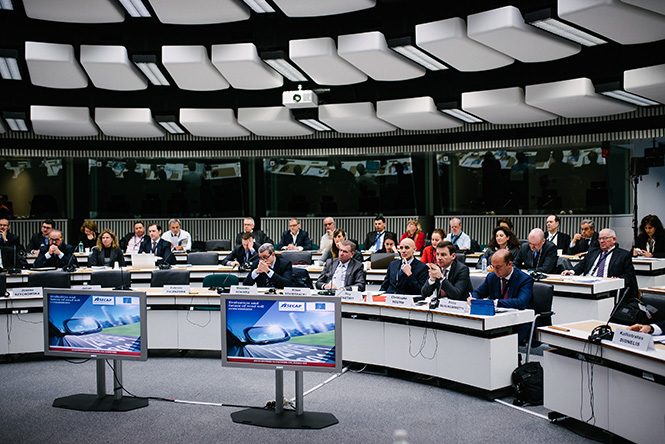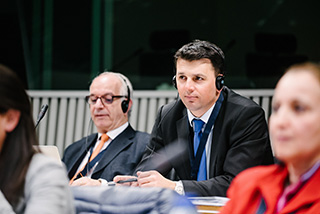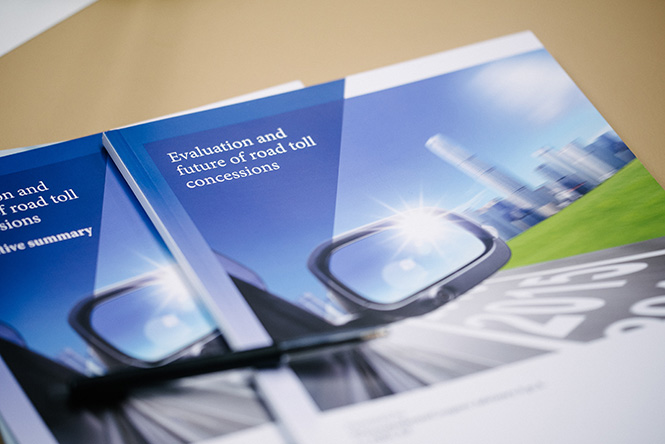ASECAP organized in Bruxelles a conference on motorway concessions in EU
Road networks play the leading role in European mobility landscape. Despite the effort spent by the European Union and by the Member States to stimulate the use of other mode of transport, road transport still represents the most used way of moving people and freight across Europe: 72% of passengers move by car and 45% of freight is moved by trucks.
However, road network still requires urgent and huge investments. The completion and maintenance of the European road network is of uttermost importance to support European integration and economic growth. In particular, bridging missing links would help to integrate remote territories and building a more resilient network. Road administration bodies should focus their transport policy on developing and optimizing road networks in urban areas to reduce congestion whilst enhancing sustainable mobility.
Motorways are the safest and less congested type of roads and they can ensure a smoother and speeder traffic flow compared to other road categories. However, compared to them, they are more expensive and imply a more complicated pperational model (e.g. collection of fee in case of tolled motorways, traffic flow control, make sure that maintenance and safety of equipment is adequate to speed, ecc).
How well are we familiar with concession model
In the typical and “pure” toll road concession scheme, a specialized operator (the concessionaire) is in charge of financing, building, maintaining and operating the motorway against the right of collecting tolls from road users. However, depending on national policies and aims, various other forms of financing have been tested and applied on European roads. Some of them proved to be successful, some were mostly abandoned due to inadequacies (e.g. shadow tolling).
Several cases analysed in this study showed that there is not a unique model of financing suitable for each situation, but specific conditions make viable certain forms of financing. In a context where EU Member States are struggling to find sources to finance their infrastructures, where the EU is planning to kick-off a large number of EU initiatives that might affect the tolled road concession schemes, and in light of the threats posed by the entrance in the market of non-EU companies that play the rules of unregulated markets, the aim of the study is:
- to clarify what a toll road concession is,
- to shed more light on issues concerning concessions as well as bottlenecks for the development of road infrastructures,
- to highlight the benefits of the concession schemes and the conditions for ensuring their proper implementation across Europe.

Results and goals of the Study
Various experiences in different countries show that the use of toll roads and concessions thanks to the economy of scales generated by the management of a portfolio of assets and by the management and technical knowledge of concessionaires, is much more efficient and sustainable than any other road financing system. Nowadays the concession model represents the most flexible tool for constructing, maintaining and operating a motorway network, since it can be adapted to different local conditions in terms of regulation, traffic and operational conditions.


Concessions can provide concrete benefits on the road infrastructure sector
- It allows reliable and fast movements of passengers and goods assuring the best road safety standards and the highest level of service,
- It allows significant investments overcoming the spending constraints foreseen by the Stability and Growth Pact and it serves public interest by ensuring the proper allocation of limited public financial resources to other priority area (e.g. education, health),
- Thanks to the earmarking of toll revenues, it guarantees proper maintenance of the infrastructure during the whole concession period, committing both human and monetary resources,
- It generally implies more rational construction costs and an efficient management of both public and private capitals by choosing and investing in the best projects based on sound financial performances and reliable business plans,
- It allows relevant fiscal return to the general budgetof States through taxes,
- It allows more flexibility to react to changes in overall economical situation and to adapt to a new environment from legal, technological, financial point of views as long as the new objective requirements does not breach the original contractual arrangements and are in line with available cash flows,
- It shortens considerably the amount of time required to begin the road construction works whilst also reducing their duration, without waiting for the availability of public funds,
- It allows the transfer of risks to dedicated counterparts: mainly those related to construction costs and traffic demand,
- It allows interested shareholders to participate in the definition and design of the project at an early stage,
- It ensures the development of infrastructure with required quality standards, including appropriate measures to itigate environmental impacts (e.g. sound barriers, waste waters control, sound-absorbing surfaces) taking also into account climate and environment challenges,
- It supports research and development, contributing to introduce innovative solutions to enhance safety as well as to monitor traffic flows (e.g. intelligent transportation system).
- It can foster new sustainable mobility services and usages (HOV lanes, mass transit services through express buses and coaches, car-pooling), contributing to address the negative externalities related to road transports and enabling the reduction of external costs of transport.

Conclusions and recommendations
The need for investments for the completion of the road network comes in a period when State finances are scarce. Maintenance and upgrades on the existing network becomes an increasing burden on State budgets and delayed maintenance works resulting from budget adjustments are leading to increased costs of repairs or worst, ailing infrastructure. As mentioned, public funds for new investments are scarce: sectors with self-financing capabilities should be tapped when possible, therefore schemes involving private investors, such as road toll concession models, should be favored.
Concession model represents an alternative powerful tool to help building and maintaining European roads without leveraging on State finances. Road administration bodies should focus on leveraging the investment capabilities of mature concessions in order to avoid passing costs to taxpayers. In particular, the possibility of backing new concessions to mature network represents a viable way to complete works without delays and at minimum costs both for public finances and road users. Further, European toll operators wish a more flexible approach on contract management (e.g. tariff increases, duration extensions, etc.) to finance new investments and upgrades of the network, in compliance with European regulations. In general, toll road concession sector in Europe needs further innovative contractual tools supporting the economic and financial balance of the Concessionaire to attract private investors.
Concession schemes should be optimized in order to attract private investors. In particular, the promotion of the legal certainty and predictability of the concession schemes is a prerequisite for private investments. Further, the development of high-tech solutions should enhance security through Intelligent Transportation System (ITS) and facilitate tolling with secure modern payment means. In order to alleviate the position of the Concessionaire, most of the European toll operators wish the introduction, within the concession agreement, of clauses authorizing the revision of general risk allocation schemes, authorizing modulation of risks over time due to the evolution of the network and possibility to rely on government subsidies in certain cases (e.g. major traffic decreases). New concession agreements and the revision of the existing ones should also be aimed at identifying clearly the cases that imply economic rebalance of the concession contract, at facilitating tariffs increases or period extension to make economic rebalances and at allowing introduction of minimum income guarantees. Toll Road operators are willing to share the findings and recommendations with the European institutions and European stakeholders in order to create a common and consolidated vision on this important instrument.